A university’s surroundings are often a magnet for incoming students and faculty. Stanford’s position near the business center of Silicon Valley, NYU’s central location in one of the world’s exciting cities, Harvard’s historic campus near to downtown Boston- they all make for attractive calling cards that attract top talents. ShanghaiTech University is no exception. Its location, not just in bustling Shanghai, but specifically in the heart of Zhangjiang Hi-Tech Zone, has brought students and faculty many benefits.
For ShanghaiTech students entering their third year, the summer term allows for opportunities to envision a possible future for themselves, through ShanghaiTech’s Industry Engagement program. This year the Industry Engagement program allowed more than 300 ShanghaiTech students and 20 professors to engage with 60 companies in 17 industries, from medical device manufacturing to artificial intelligence. This year top companies like IBM, AMD, BASF, Dow, Roche, Novartis, Philips, GE, United Imaging and Lenovo all opened their doors to ShanghaiTech students.
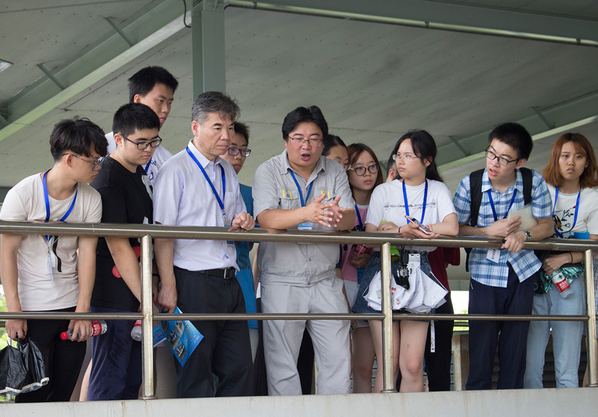
Jiang Zhihao, an Assistant Professor in the School of Information Science and Technology, volunteered to lead a team investigating the Medical Device industry in July. Jiang, whose own research is related to software engineering with application in smart medical devices and connected cars, said he valued the experience for the opportunities it offered his team to see behind the scenes in the medical device industry. The goal for the students, he said, was to broaden their minds, and show the complexity of the industry, including the various stakeholders and their perspectives.
The students were highly self-motivated, he said and were responsible for managing the logistics of each visit. Jiang and his small team of five students headed off, visiting four to five companies, each for about a half-day. “They did their research and asked tough questions,” he said, including some that really surprised him. After two weeks of visits, the students wrote reports summarizing their findings. “I’m very proud of them for writing such a comprehensive report,” he said. In fact, he added, “I want to invite some students to give a guest lecture to share their findings. I hope some of them can develop interests in the medical device industry and pursue it for their future career.”
SLST Professor Qi Wei, who teaches a Drug Discovery and Development course and led students to investigate new drug development in July, said that this kind of engagement is crucial for students to find their post-graduation path. “ShanghaiTech is committed to promoting the application of knowledge into industry,” she said. Qi added that for many universities, engagement with industry is focused on faculty research, but ShanghaiTech really expands the focus to supporting students as they explore career opportunities.
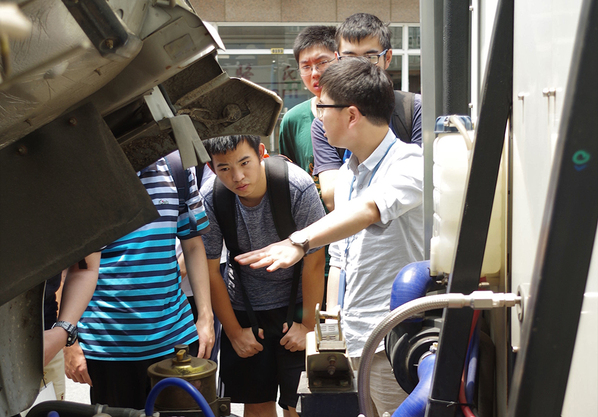
Song Wei, a third-year student at the School of Life Science and Technology, participated in an Industry Engagement program investigating AI Medical Health industry. She was interested to explore cross-disciplinary opportunities and learn about a new industry. “I wanted to understand more about what the biggest challenges are for these companies, and which department my knowledge and experience would be best suited for,” she said. After participating in the program, she became more interested in pursuing a management position at an R & D company.
Third-year SIST student Luo Jianwen saw participating in the Industry Engagement Program as a crucial part of preparation for his post-university life. “I wanted to meet industry leaders and learn from their experience. I don’t know exactly what path I’ll take but it can’t hurt to make connections with not only their CEOs and leaders but also with their engineers.”
Luo said he most valued the opportunity to ask any question that he wanted during the Industry Engagement Program site visits. “Even if they couldn’t always answer I got something from it.” Luo emphasized that the program really benefits everyone from the students and faculty to the school and the companies. While for many students, the program is a first step towards applying for internships, Luo had been lucky enough to intern at one of the companies his team visited earlier in his university career. After winning a competition freshman year, Xilinx, an American tech company with offices in Zhangjiang, invited him to work for them for a year, allowing him a unique opportunity to get a first-hand look behind the scenes.
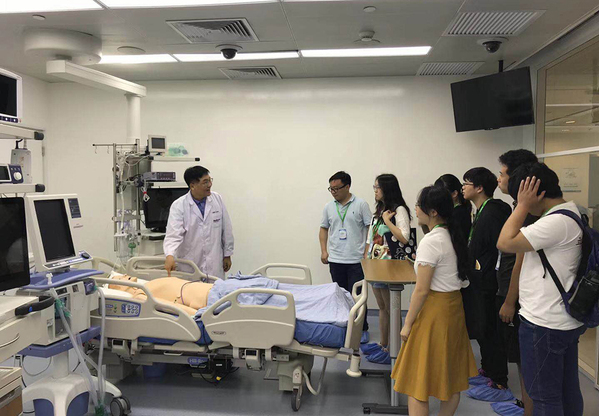
These early interactions with companies in the Shanghai area introduce ShanghaiTech students to the wealth of professional paths they could take after graduation. While most of the companies are looking to hire graduates with masters or PhD degrees, the early connections can give students a sense of direction and help them build their professional network and apply for internships. “It allows companies to learn about ShanghaiTech students,” Luo said. “It really helps us take advantage of our location as a benefit.” Zhou Pinqiang, Associate Professor and Assistant Dean at SIST agreed. “When they are looking for work opportunities, they just have to go outside the university gates.”
The school’s location was one of the factors in Zhou’s decision to join ShanghaiTech as an Assistant Professor back in 2013. “My research is in EDA and IC design and most of the top companies in this industry are in Zhangjiang. So the geographical location really is ideal,” he said. “During my time at ShanghaiTech, I have initialized research collaborations with the local IC companies, such as Zhaoxin, IC R&D and Hisilicon.”
Jiang agrees that there are many benefits for faculty as well. “Initially I saw the Industry Engagement Program as a professorial duty, but then I found I learned a lot from this experience too,” he recalled. “We had a chance to see what the real challenges are in the industry and to compare between foreign and domestic companies. A recent returnee from the US, Jiang said he was glad to be able to build connections with industry here. Next year, he added, he’ll definitely join again to lead a team.
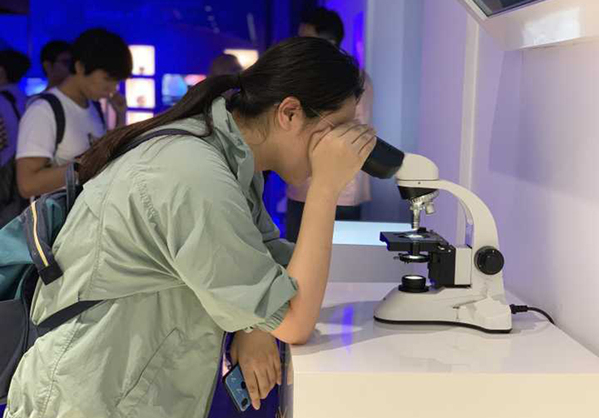
For Ray Stevens, Founding Director of ShanghaiTech’s iHuman Institute, the easy interaction between academia and industry, between research and application, is why Shanghai is such an exciting place to live and work. iHuman is engaged in a project with the ultimate aim to reduce the cost of healthcare by diagnosing disease early. “Boston, San Francisco, Silicon Valley, San Diego Cambridge, what they all have in common is they do have a collaborative culture, across the whole city, and, and that's what I like about Shanghai. It is very open to collaborations across the city,” he said.
The project that iHuman is working on, imaging across the scales, is a perfect one to be based in the Zhangjiang Hi-Tech Park. “The resources and collaborations are ideal and they all are in Shanghai, so that makes it the perfect place to do this work. Shanghai feels a lot like Silicon Valley in the nineteen seventies between Stanford and the early dawn of the computer industry.”
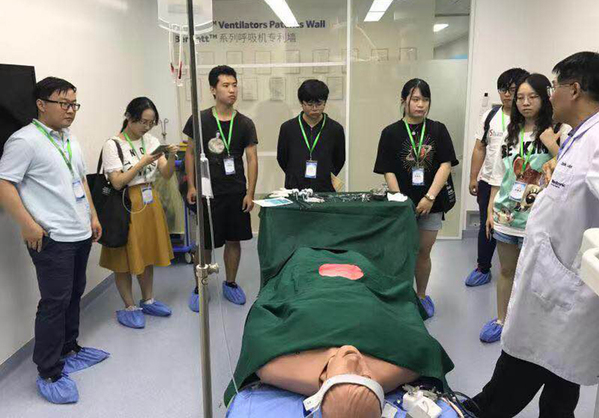
It’s not just academia and students that reap the benefits of easy connection with Zhangjiang companies. Companies benefit a great deal from connecting with the ShanghaiTech community. Xia Zijun, a senior technologist at Suez, a water treatment company based in Zhangjiang, said the Industry Engagement program has helped her company match with the best internship and job candidates. “Back when I was working at an MNC, it was much easier to attract internship candidates, but our company is not as famous so students aren’t so familiar with what we do,” she said. “At first the students have no idea how their studies could be related to the work we do in water treatment, but after they visit us, they expand their and they can begin to imagine how what they’re learning can be applied to what we are doing. Last year after the industry engagement program we had two excellent students from ShanghaiTech join us as interns.”
Xiang Bin, a former Project Team Leader and Lab Head at Novartis who is now founder of CommBio Therapeutics, a drug discovery start up in Zhangjiang said he has benefited a great deal from collaborating with ShanghaiTech as an industry mentor. Each trimester, he attends several activities with students on campus, and also gives advice or meets students who are interested in his work.
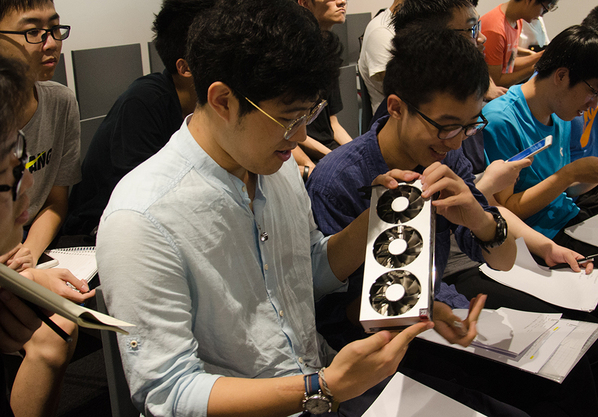
Interacting with the students is a rewarding experience for him, not just because he can share his wealth of experience. “Sometimes they also inspire me. They are really open minded and exposed to different knowledge. Sometimes they have brilliant ideas that can help me shape my thinking on a project,” he said.
Xiang, who has benefited from the support from mentors at every stage in his career enjoys this opportunity to give back. “I see this as an opportunity to get connected and share my views with students. If I can pass on some of my knowledge and experience to inspire more people to enter the biopharma industry, it’s worth it,” Xiang said.
These types of interactions, whether one-on-one mentoring, site visits, or research collaborations, are what make ShanghaiTech such an exciting place to study and work. The university’s location in Zhangjiang makes all this possible, but it is the people- the students, faculty, staff and researchers- creating these dynamic exchanges who truly are responsible for creating this energetic environment.

